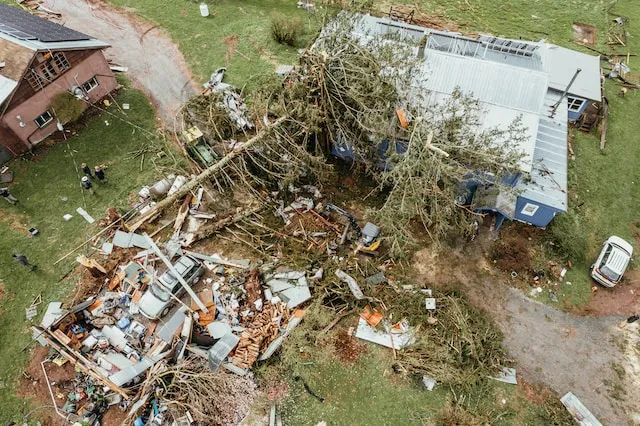
Amigo Insurance Review: The Ultimate Guide
Table of Contents Do you want to know more about Amigo Insurance before you buy it? Want to delve into the details of Amigo Insurance
If you are a homeowner, you should protect yourself by knowing how home insurance claim adjuster secret tactics are implemented for their insurer’s best interest in case you file a claim.
An important thing that often goes unnoticed is that insurance companies are for-profit. Their only goal is to generate more profit at the expense of their customers.
When a homeowner files a claim, it usually means there has been some mishap in the house, and they are anxious and desperate to get the settlement.
Home insurance claim adjusters take advantage of this situation and resort to unethical and sometimes illegal practices to offer the lowest settlement offer possible or even deny the claim altogether.
These tactics can be frustrating and time-consuming for homeowners trying to receive the coverage they are entitled to.
But Don’t Worry; this article will acquaint you with the 21 common home insurance claim adjuster secret tactics and provide instructions on protecting yourself.

One of the most common practices prevalent in the Insurance industry is to coax the claimant to admit fault. If the claimant admits or even partial fault, it can harm them and result in a significantly lower settlement value.
The two most common strategies used by home claim adjusters are the following:
Some examples of the typical blame game are as follows:
This gaslighting technique, where they try entirely to transfer the blame and liability on the claimant, is quite common and can happen to you if you are not careful.
Never admit fault or partial fault or give any hints reflecting guilt.
They may try to force it out from the claimants as they are usually distressed and vulnerable and are looking for a resolution.
However, one needs to be focused when communicating with these adjusters and give answers that put you in a position of power.
Another common practice to demotivate the claimants by adjusters is procrastinating the claim process.
The more time the insurance adjusters take, the more anxious and nervous the claimants become. They deliberately avoid picking up calls or replying to emails.
This tactic aims to make the distressed claimants reach a tipping point and accept a lowball offer.
However, one should remember not to give in to such tricks and learn how to scare the insurance adjusters. For example, this is a bad faith case, and a property damage attorney can help you protect your interests.
Another frequently used home insurance claim adjuster secret tactic is to issue a false deadline to the customers for accepting the settlement offer.
In reality, no such deadlines or rules force the claimant to accept the settlement within a specified time limit.
The claimant can reject the lowball offer and renegotiate the settlement value. They don’t have to accept the offer under any circumstances within a specified time.
The best option would be to take an attorney’s help to write a rejection letter and put a counteroffer on the table.
The insurance documents are purposefully prepared in a long and complicated manner full of technical jargon that ordinary people find challenging to comprehend.
It is intentionally made to confuse the claimants and take an advantageous position.
When a claimant files a claim, it is common for the adjusters to deny it, citing some technicality that doesn’t cover the damage.
However, in most cases, these are untrue, and the adjusters simply lie on the face of the claimants knowing they won’t be able to find out.
Please be advised not to believe such claims as you are rightfully owed the insurance money as you have paid for the insurance policy. You should immediately contact a professional lawyer.

When a disaster or mishap causes damage to a property, it is given that the homeowner would contact the insurers to file a claim.
When a claim is filed, an adjuster representing the Insurance Company investigates to conclude the severity of the damage, the liable parties, and the cost of the damage and finally calculate the settlement value.
They may even deny the claim based on the circumstances. To investigate, they need client documents like receipts, invoices, witness reports, photographs, etc.
Sometimes, adjusters who are unethical try to dupe the claimants by asking for irrelevant documents, knowing that the claimant would probably not be able to present that so that they can offer a lowball offer or completely deny the claim.
For example, suppose a claimant had earlier damaged his roof and repaired it long back, which again got damaged due to the recent mishap.
The adjusters may ask for invoices and repair details, which the claimant may not have. As a result, they may say that the current roof damage was a reoccurrence of the previous damage as it was not adequately repaired and would not be covered under the insurance policy.
It is usually done to offer a lowball offer. Don’t Accept, and lawyer up.
The most likely thing that happens when a claimant files a claim against the damage in the property caused by the mishap is to receive a lowball offer from the adjusters.
As is the case most of the time, it’s not that the claimant has made a judgment error while estimating the damage, but it is a trick used by insurance adjusters whereby they want to confuse the client and make it look like they have overestimated the costs of repair.
However, the claimants are not obliged to accept the lowball offer, and they get the costs estimated by individual contractors or public insurance adjusters.
The ideal thing to do in this situation is to hire an experienced attorney with all the resources available to carry out an independent investigation and estimate the actual costs.
This estimate can then be presented to the adjusters who argue against the unvalued claim and renegotiate for a fair settlement value.
Another home insurance claim adjuster secret tactic is to advise against getting legal counsel and hiring an attorney.
The main reason is that they know they won’t be able to manipulate the claimants the way they want if a property damage lawyer represents the claimant.
Hence, they not only advise against getting a lawyer citing it as unnecessary or a waste of time and money, but also claim it to be illegal.
However, the claimant has the right to an attorney and can always seek legal help for their insurance settlements.
Even after paying the legal fees, the claimants get a higher settlement offer than they would’ve gotten if they didn’t hire one.
Having a lawyer would give you peace of mind and ensure that the insurance company cannot take advantage of your lack of knowledge of how the settlement process works.
One thing to remember is that both the Insurance Company and the Insurance Adjuster are not your friends. Both are doing it to make more profit for the company and not you.
The adjusters are just doing their job, and part of that job is to offer the claimant as low a settlement offer as possible and save the insurer’s money which will translate to a higher commission for the adjuster.
Hence, always remember if an adjuster is being overly friendly, they are doing it to make you trust them so that you divulge information that you shouldn’t and use that information against you to offer you a lowball offer or deny the claim altogether.
So, as long as the adjuster is being professional and behaving as they should, it’s okay, but as soon as they try to befriend you, be alert and don’t share things you shouldn’t.

Always be focused and careful when you are dealing with home insurance adjusters. Remember, they are not your friend and will always work for the company’s benefit.
Sometimes, they may provide assurance and commitments as part of the settlement offer, which goes against the insurer’s interest. So, take it with a pinch of salt, and don’t just believe what the adjuster is promising if it is not given in writing.
It’s even better if you have a lawyer to go through all the paperwork or any promises these adjusters make, as they won’t be able to deny it so easily later.
The adjuster’s primary job is to investigate the damage caused to the property, collect supporting evidence and documents and then reach a conclusion on the settlement offer.
Now, adjusters know that the claimants are distressed after the disaster and the damage that the property has gone through, so they make it a point to make the process painstaking and agonizing for the claimant.
They will take their time and work on the settlement offer and won’t give the numbers so quickly. The idea is to pass as much time as possible so the anxious claimant will accept whatever is offered.
However, the claimants must act patiently and not accept the lowball offer. They have the right to negotiate the settlement offer.
Hiring a lawyer can solve this issue as they know all these tactics and can pressure the adjuster to give the numbers.
Even the adjusters would avoid giving a lowball offer if an experienced attorney is present.
Even if they do, the lawyers can argue on your behalf, reject it and present a strong counter-offer for a fair settlement.
Often, the tactic that home Insurance Claims Adjusters take is to bully or intimidate the claimants so that they are compelled to accept a lowball offer.
They may often point out that the damages are not covered in the policy, that the claimant is liable, or that the estimation is too expensive. If you resist, they may threaten to deny the claim and even take legal action.
However, it is crucial to understand that these are scare tactics, are not allowed, and can lead to a bad faith claim. The claimants have to stand their ground and fight this off to get a fair settlement.
Again as mentioned earlier, the best solution is to seek legal aid to experience a smooth claims process.
Another pervasive home insurance claim adjuster secret tactic is to demand a recorded statement and financial records from a claimant.
It is an intimidation technique that may make the claimants nervous, and as a result, they may reveal information that would jeopardize their settlement offer.
Since these adjusters are trained in investigation tactics, they may ask questions that would enable them to weaken or deny the case.
Hence, even if you agree to a recorded statement, only stick to facts and don’t admit to fault or part fault in the statement.
The best practice would be to hire an attorney and ask the adjusters to lay everything down in writing so that your recorded statements cannot be used in any way without your knowledge.
As established earlier, the insurance adjuster aims to release as much low settlement as possible to the claimants and save the insurer’s money.
Hence, another common insurance adjuster tactic they often implement is to force a repair instead of replacing a damaged property.
They often try to convince the claimants that a replacement is unnecessary and a repair would suffice, as a repair job is much less expensive than a replacement.
However, one should not simply trust what they say and get it investigated privately by specialists and contractors to identify if a repair would suffice or if a replacement is necessary.
Take professional quotes, recommendations, and estimates and present them to the adjusters. Otherwise, adjusters may push for repairs and provide substandard materials, which may cost you in the long run.
You can always reject their suggestion and only settle for a fair value that you deserve.
There are many incidents where the insurance holder’s property is destroyed or displaced, and they must make alternate arrangements.
Not everyone can afford this extra burden, which puts much stress and anxiety on that person.
So, the insurance claims adjusters know this, and when a claimant files the claim, they would deliberately use the signature insurance adjuster delay tactics or ignore them, making them even more nervous and edgy.
They may also say that the living expenses are too high and are not covered under the insurance policy.
This often results in claimants accepting a lowball offer as they are scared of their complicated insurance claim situation and want to get out of it as soon as possible.
However, claimants have the full right to fight against this and should not bow down to an adjuster just because they say so. Hire a lawyer and take the fight to them.

Home insurance claims adjusters are often very tricky and conniving in nature, and they try to rip off claimants in many ways.
Since many of the insurance companies pay high incentives to these agents if they can finalize a lowball offer with the claimants, they stop at nothing to achieve their goals.
They don’t hesitate to lie or fabricate facts if that helps them. Since most claimants are unaware of how things are done throughout the claims process, it’s easier for these adjusters to take advantage of them.
Claimants must keep track and record their communication with the adjusters, and if they try to fabricate or misrepresent facts to deny a claim or offer a lowball offer, simply reject it and produce a counteroffer.
If you are using an attorney, write a letter of rejection and provide evidence supporting your counteroffer, and if you feel the adjuster has lied or fabricated documents, report that adjuster.
Home insurance policies don’t require the claimant’s medical records. This is just another common tactic that adjusters use to intimidate the claimants.
You should know you have the right to keep your medical records private and convey the same to the adjuster.
A statement from the doctor or the medication bills for any injury arising from the incident, covered under the policy, is enough evidence. The claimant’s medical history plays no role in this type of claims process.
If the adjuster still pushes for it and keeps delaying the process, just tell them it’s unnecessary and put forward a bad faith claim via a property damage lawyer.
You can almost expect with certainty, as a common insurance company tactic, that the first settlement offer after you file a claim against your insurance is not to satisfy your replacement or repair estimates.
No insurance adjuster works for the claimant’s benefit, but on the contrary, they try to save the insurance company money they represent as it directly affects their compensation.
The property insurance claim adjusters may use various techniques like hiding data, lying or fabricating data, lowering the estimates, give different excuses to offer a low-ball settlement offer.
The claimants should never accept the first offer if it does not meet the requirements.
They should take their time to read thoroughly and then point out the mistakes or adjustments needed.
You can also consult a lawyer and make them write a compelling rejection letter and present a counteroffer that meets your requirements.
Negotiating with the insurance adjusters for proper coverage is always a tough battle.
The adjusters or the insurance agents try their best to deny certain coverages with all the ammunition they have. One such trick is to blame particular property damage on wear and tear or damage that were already existing.
However, you can’t give up and have to fight to convince them that this resulted from the disaster.
Get it assessed privately through reputed contractors or public adjusters and submit the report to the insurance company adjusters to prove your point.
Better yet, contact a lawyer, seek legal advice, and ask them to argue and get coverage.

One of the ubiquitous home insurance claim adjuster secret tactics is to misrepresent and distort the insurance policy’s benefits.
To gain the claimant’s confidence and get their job done, they often make false promises or spread misinformation that is officially not part of the insurance policy.
However, you should never accept this false information. You should keep a record of communication and report the crooked insurance adjuster by taking help from an insurance lawyer.
The home insurance claims adjuster might assert that the property damage resulted from a minor incident, thus suggesting it falls outside the insurance policy’s coverage as part of the insurance company tricks they keep playing on claimants.
They may ask you to convince you with their sweet talk that you should not waste time by filing for a claim as such low-impact damage will not be covered by the insurance policy.
However, as suggested multiple times, don’t take them at face value; do thorough research by reviewing the policy documents.
It usually doesn’t matter if the impact is low or high. If the property is damaged, you are entitled to a settlement against the claim. Just calculate the actual cash value of the loss and present it with evidence to the property insurance adjusters.
Take the help of a lawyer to make a stronger case and get the homeowners insurance claim check in hand.
Fraudulent activities in the Insurance industry are a long-time issue. Many adjusters resort to such insurance fraud to make the insurance company happy and take a hefty commission home.
Sometimes, unethical and bad insurance adjusters, be it from the homeowners insurance company or independent insurance adjusters, may simply deny the insurance claim by an insurance holder, citing many reasons and hoping that the claimant won’t fight back.
However, they are not legitimate often; hence, the claimants must not lose hope and fight against it.
After the insurance company issues an insurance claim denial letter, you should contact a lawyer to help you stand up to the insurance company and get a reasonable settlement value against your property damage claims.

Must Read:
The different types of claims in the case of home insurance are as follows:
In property insurance coverage, this claim is usually against the damage caused to the property by natural disasters, theft, or vandalism.
A liability claim is one when a person is seeking compensation from another party who caused harm, injury, or loss due to the negligence or fault of the other party.
Usually, the liable party takes care of the costs or covers the damages resulting from their action or inaction.
If you or a person is injured due to the disaster in your insured home, then the medical treatment costs and medicines are covered in the policy, which can be claimed via personal injury claims.
Suppose the other party is not covered but has personal injury insurance. In that case, they can hire a personal injury lawyer to do their bidding for recovering costs associated with treating their physical injuries.
Like a property damage attorney, a personal injury attorney also fights against any wrongful information, such as pre-existing injuries and low-ball settlement offers, and gets a fair settlement value for the claimant.
It applies in multiple cases, such as property damage, accident victims in car accidents, professional malpractice, etc.
Medical Bill Claims are against the medical treatments that include the cost of medicine, surgeries, or any other costs associated with the patient’s treatment.
The home insurance covers the medical treatment costs resulting from the disaster that damaged the property.

Read About:
When you are filing a home insurance claim, collect the following document to support the amount you have estimated. It would be best to get the help of a lawyer to do this.
The most frequently asked questions are as follows:
To get the most out of a claims adjuster, follow these tips:
Some of the most crucial home insurance claim tips to ensure successful settlement are as follows:
R&R stands for Remove and Replace and is used when an item is wholly demolished or removed and replaced with a new item of a similar grade and composition.
Read More:
Most of us never predict any disaster or mishaps, but they are a reality and can happen to anyone. As a result, we often do not care about the details of the insurance policy we get and understand the nitty-gritty details mentioned in the complex documentation.
However, when disaster strikes and we need to claim the money, it seems like a daunting task to communicate with these tricky insurance claim adjusters.
In this day and age, we must understand the home insurance claim adjuster secret tactics to defend ourselves.
Hopefully, the detailed analysis of all the tactics and the relevant instructions will help you prepare.
Disclaimer: The information provided in this article is for informational purposes only and should not be construed as financial advice. The author’s opinions are their own and should not be taken as a recommendation to invest in any particular product or service. It is strongly advised that you consult a financial advisor before making investment decisions. Investing always carries risk, and it is up to each individual to consider their options and make informed choices carefully.
Share this post:

Table of Contents Do you want to know more about Amigo Insurance before you buy it? Want to delve into the details of Amigo Insurance

Table of Contents Are you looking to buy insurance for your motorcycle? Have you heard of Harley David Insurance but are unsure whether it is

Table of Contents Want good insurance for your vehicle? You have heard about Karz Insurance but are still determining whether it is the best fit